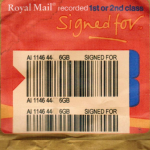The story of Jewish migration in the last 150 years is amply documented. It is a seemingly endless trail of persecution, destitution, and desperate flight from home. Its legacy is written across the world, and is etched into the modern Jewish character: many older Jews will wear expensive jewellery as an instinctive hedge against the possibility that one day they might have to flee. Ultimately—at least from a popular modern perspective—it was a story with a happy ending: those that escaped worked hard and eventually built successful lives elsewhere, securing a bright future for their children. Of course this is saccharine. Like the refugees of today, many migrants remained desperate and obscure, leaving little for history to record. From the fragments that remain, I have reconstructed the life of one unremarkable man.
Month: September 2012
 This grainy image is the only picture I have ever seen of my maternal grandfather David Samuel Richards, known to his friends as Don. He worked for a family in Theydon Bois in the 1930s, as an engineer at Martin-Baker during and after the war, and was also an amateur wrestler. My grandmother divorced him in 1960, shortly before destroying every piece of evidence that he ever existed. All contact was subsequently lost. This may be the only surviving image.
This grainy image is the only picture I have ever seen of my maternal grandfather David Samuel Richards, known to his friends as Don. He worked for a family in Theydon Bois in the 1930s, as an engineer at Martin-Baker during and after the war, and was also an amateur wrestler. My grandmother divorced him in 1960, shortly before destroying every piece of evidence that he ever existed. All contact was subsequently lost. This may be the only surviving image.
 The Royal Mail‘s Print Postage Online service can save a huge amount of time if you’re sending something that falls foul of their arcane pricing structure. You can print out a personalised label, bung it on the envelope, and—if it’ll fit in a postbox—send it on its merry way all by yourself.
The Royal Mail‘s Print Postage Online service can save a huge amount of time if you’re sending something that falls foul of their arcane pricing structure. You can print out a personalised label, bung it on the envelope, and—if it’ll fit in a postbox—send it on its merry way all by yourself.
I’m not actually suggesting that you avoid this service altogether: it’s just too useful, and is to stamps what the debit card has become to pocketfuls of change. Clearly its use for ordinary post is a loss to Post Office branches, but there’s a way in which it actually costs them money. If you print a label for a service that requires the item to be handed in (like special delivery, so it can be barcoded and scanned on submission), your local post office gets absolutely nothing. As they have to spend time processing the item, which can take a few minutes, and then storing it on their premises, sending items in this way is directly detrimental to that branch.
Many smaller branches’ postmasters are not salaried, and only make a living through transaction commission. Sadly and bizarrely, handing in a pre-printed item for processing is not seen as a transaction: even though the branch does most of the work, they don’t actually make the sale.
Most people, especially in rural areas, are keen to support their local post office for themselves and their community. So do them a favour: if you need their help to send stuff, let them take your money. You’ll make a postmaster very happy.
If you’ve ever needed to benchmark (or load test) a webserver, you’ll be familiar with Apache Benchmark (ab), a brilliant tool that will hammer your webserver with lots of concurrent requests and give you statistics, histograms and and graphs—everything apart from how hot the server got! This is useful to determine when things like the network and webserver processes hit some limit or other, but for a modern web application it is of limited use, because more than likely you’ll end up requesting a cached page over and over again.
